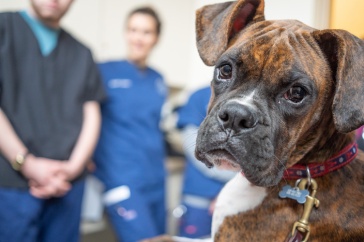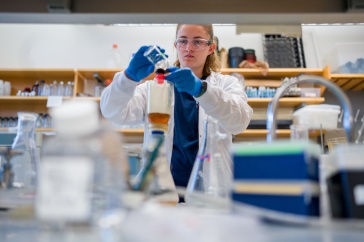
UNH researchers who have been working to better understand what is causing a respiratory illness in dogs since making a significant discovery in relation to the mysterious infection last fall will receive a boost thanks to a grant from the American Kennel Club Canine Health Foundation (CHF).
Last November, researchers at UNH’s New Hampshire Veterinary Diagnostic Laboratory (NHVDL) and Hubbard Center for Genome Studies (HCGS) made a critical advance in connection to the illness, which has affected thousands of dogs and perplexed veterinarians throughout the country.
The grant – which totals a little more than $308,000 – is the first UNH has ever received from the American Kennel Club and is particularly significant because the university does not have a veterinary school, says David Needle, pathology section chief at the NHVDL and clinical associate professor in the College of Life Sciences and Agriculture (COLSA).
Last fall, the UNH researchers identified a small portion of the genome of a previously uncharacterized bacteria that may be causing the illness, using genetic sequencing of samples from 70 dogs. They have continued to explore the bacteria, and the hope is that the new funding will bolster that process and perhaps lead to finding ways to treat the illness.
“We’re going to be able to use this funding to leverage the best genomic sequencing that exists to really define this potential pathogen,” Needle says. “It can help direct future research but also potentially help direct treatment.”

a unh research team including (left to right) Joseph Sevigny, Stephen Simpson, Jeffrey Hall, David Needle, Tessa Baillargeon, Kari Hartman, Muriel Kelly, Kelley Thomas and Lawrence Gordon has been working to learn more about a mysterious dog illness since making a key discovery last fall.
.
"Dogs of all ages and breeds are susceptible to respiratory infection. This project addresses a growing concern and is an exciting opportunity to learn more about canine respiratory pathogens," says Stephanie Montgomery, chief executive officer of the CHF. "We hope an improved understanding will lead to prevention and better treatments safeguarding our beloved companions."
The UNH researchers plan to utilize multiple techniques to build a complete picture of the interaction between the potential pathogen, the microbiome of the dog and animal health. They will use metabarcoding – an analysis of specific shorter segments of a gene that are common but also vary within a population – to better understand the bacterial and fungal microbiome of affected dogs. In addition, they will utilize hybridization capture, wherein hundreds of probes directed at myriad known viruses will define the viral component of the microbiome.
Lastly, the team will use shotgun metagenomics on a subset of positive cases. This is the most powerful technique in next generation sequencing, Needle says, which provides a complete sequence of all genetic material (host, microbiome and potential pathogen or pathogens) in a sample. If the researchers can learn more about what happens to the dog’s microbiome through this work, it could help lead to discoveries that help diagnose and treat the illness. The combination of access to ongoing clinical diagnostic cases, these cutting-edge molecular techniques and the analyses associated with them are unique to the NHVDL-HCGS collaboration, Needle says.
Dogs continue to be afflicted by the illness that first hit headlines last fall. Needle says that samples continue to come into the lab – he said they’ve had a “continuous steady stream” since the news broke – and that California recently had its first occurrence of a symptomatic dog in which genetic material of the potential pathogen was present.
UNH is uniquely positioned to carry out the continued work, thanks to the facilities in place at the NHVDL and the Hubbard Center, Needle says. He pointed to previous investments that have created a “robust core facility” that will allow the team to take advantage of the best long-read technology in relation to the research.
That means that while the CHF grant will certainly further the current investigation regarding the dog illness, it could also potentially have more significant long-term impact.
“At the very least this funding will let us hammer down and define this bacteria better, but we’re also going to find things out that are going to be informative and helpful in the ways we characterize respiratory disease more broadly,” Needle says.
-
Written By:
Keith Testa | UNH Marketing | keith.testa@unh.edu


















































